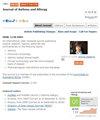Real-World Effectiveness of Mepolizumab in Patients with Allergic and Non-Allergic Asthma
IF 3.7
3区 医学
Q2 ALLERGY
引用次数: 0
Abstract
Purpose: Real-world data on mepolizumab in patients with severe asthma and allergic and non-allergic phenotypes are limited. This study investigated the effectiveness of mepolizumab treatment in patients with severe asthma with allergic and non-allergic phenotypes.Patients and Methods: This retrospective cohort study (GSK ID: 214148) used administrative claims data from the Optum Research Database. Eligible patients were ≥ 6 years of age with asthma and had ≥ 2 mepolizumab claims post-index. Index date was the first mepolizumab claim/administration (January 2016–December 2018). Patients were divided into two cohorts: allergic and non-allergic asthma, based on diagnosis codes, medication use and lab test results. Outcomes included the rate of asthma-related exacerbations and oral corticosteroid (OCS) use during the 12 months before (baseline period) and 12 months after (follow-up period) mepolizumab initiation. Study ended in December 2019.
Results: Overall, 240 (44.6%) and 298 (55.4%) patients were included in the allergic and non-allergic asthma cohorts, respectively. Mean (standard deviation [SD]) counts of asthma-related exacerbations were significantly reduced from baseline to follow-up in both the allergic and non-allergic asthma cohorts (3.2 [2.5] to 2.1 [2.1], p < 0.001 and 2.5 [2.2] to 1.7 [1.9], p < 0.001, respectively). The mean number of OCS pharmacy claims was significantly decreased by 33.3% and 41.4% from baseline to follow-up in the allergic and non-allergic cohorts, respectively (p < 0.001); mean daily OCS dose significantly decreased by 30.6% and 45.4%, respectively (p < 0.001) as well as the mean number of OCS bursts, which decreased by 44.9% and 41.8%, respectively (p < 0.001). No significant differences were observed between cohorts in reductions in asthma exacerbations, counts of OCS pharmacy claims or OCS bursts (baseline to follow-up).
Conclusion: Mepolizumab significantly reduced asthma exacerbations and OCS use in patients with allergic and non-allergic asthma, suggesting that mepolizumab provides real-world benefit in severe asthma irrespective of whether a patient has an allergic phenotype.
Keywords: severe asthma, phenotype, exacerbation, oral corticosteroid
美妥珠单抗对过敏性和非过敏性哮喘患者的实际疗效
目的:有关美妥珠单抗治疗重症哮喘、过敏性和非过敏性表型患者的真实世界数据有限。本研究调查了过敏性和非过敏性表型的重症哮喘患者使用美妥珠单抗治疗的有效性:这项回顾性队列研究(GSK ID:214148)使用了 Optum 研究数据库中的行政报销数据。符合条件的患者年龄≥ 6 岁,患有哮喘,且指数后有≥ 2 次美保利珠单抗索赔。索引日期为首次美泊利珠索赔/用药日期(2016 年 1 月至 2018 年 12 月)。根据诊断代码、用药情况和实验室检查结果,将患者分为两组:过敏性哮喘和非过敏性哮喘。研究结果包括开始使用甲泼尼珠单抗前12个月(基线期)和使用甲泼尼珠单抗后12个月(随访期)期间哮喘相关恶化率和口服皮质类固醇(OCS)使用率。研究于 2019 年 12 月结束:过敏性哮喘组和非过敏性哮喘组分别有 240 名(44.6%)和 298 名(55.4%)患者。过敏性哮喘组和非过敏性哮喘组的哮喘相关恶化次数平均值(标准差 [SD])从基线到随访期间均显著减少(分别从 3.2 [2.5] 降至 2.1 [2.1],p < 0.001 和从 2.5 [2.2] 降至 1.7 [1.9],p < 0.001)。从基线到随访期间,过敏组和非过敏组的平均OCS药房报销次数分别显著减少了33.3%和41.4%(p < 0.001);平均每日OCS剂量分别显著减少了30.6%和45.4%(p < 0.001),平均OCS爆发次数也分别减少了44.9%和41.8%(p < 0.001)。在哮喘加重、OCS药房报销次数或OCS爆发次数(基线至随访)的减少方面,各组间未观察到明显差异:结论:美博利珠单抗可明显减少过敏性和非过敏性哮喘患者的哮喘加重和OCS使用,表明无论患者是否具有过敏表型,美博利珠单抗都能为重症哮喘患者带来实际获益。 关键词:重症哮喘;表型;加重;口服皮质激素
本文章由计算机程序翻译,如有差异,请以英文原文为准。
求助全文
约1分钟内获得全文
求助全文
来源期刊

Journal of Asthma and Allergy
Medicine-Immunology and Allergy
CiteScore
5.30
自引率
6.20%
发文量
185
审稿时长
16 weeks
期刊介绍:
An international, peer-reviewed journal publishing original research, reports, editorials and commentaries on the following topics: Asthma; Pulmonary physiology; Asthma related clinical health; Clinical immunology and the immunological basis of disease; Pharmacological interventions and new therapies.
Although the main focus of the journal will be to publish research and clinical results in humans, preclinical, animal and in vitro studies will be published where they shed light on disease processes and potential new therapies.
 求助内容:
求助内容: 应助结果提醒方式:
应助结果提醒方式:


